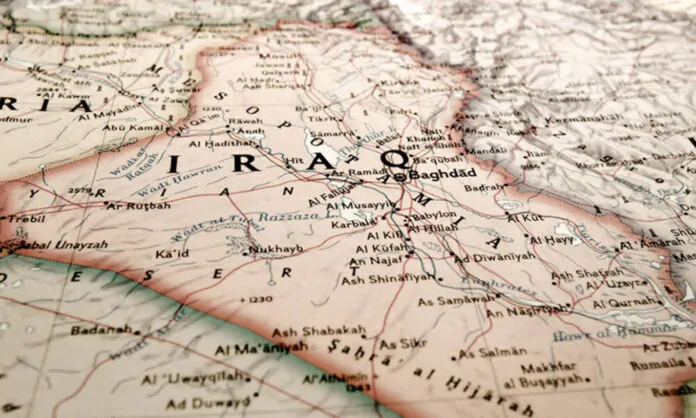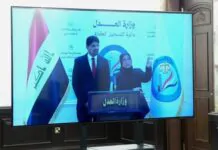Supporters of the proposal claim that a sense of “marginalization and exclusion” has rekindled the debate regarding the establishment of a Sunni Arab autonomous region in Iraq’s western governorates.
The initiative’s proponents argue that establishing such a region is necessary to safeguard their rights and ensure better governance. However, political analysts warn that the proposal is premature despite its constitutional legitimacy because it lacks the necessary conditions for forming this region, such as effective leadership, political and security stability, and adequate financial resources.
Is It in the Constitution?
Based on Article 119, which states that each governorate or multiple governorates have the right to request the formation of a region through a referendum, the Iraqi constitution permits the formation of regions. There are two ways to make the request: by one-third of each provincial council’s members who intend to form the region; secondly, by one tenth of the voters in each governorate that plans to form the region. The Prime Minister’s office receives this request next.
Demands from the Past Zina Al-Saab, a political affairs researcher from the governorate of Al-Anbar, stated, “The issue of a region in the western governorates was raised years ago in Saladin governorate, where a group of politicians gathered signatures from approximately 20% of the governorate’s population.” They made a request to the government in Baghdad, but it was denied. Residents of Saladin won the right to establish the region after filing a subsequent complaint with the Federal Court. However, as a result of accusations or being bought off, those accountable for the referendum have dispersed, and the situation has since stalled.”
“Recently, the topic resurfaced with a request submitted to the Iraqi government on February 24, 2024, to form the Central Region, which would include all segments of Iraqi society and maintain Iraq’s unity in the governorates of al-Anbar, Mosul, Diyala, and Saladin,” Al-Saab continued. The issue has gained traction on social media and in the news as a result of tribal leaders holding a conference in al-Anbar and the Iraqi government’s lack of response.”
“Residents of the western governorates feel marginalized and excluded, unable to control their affairs, prompting them to demand a region to improve their living conditions and governance,” she said. This isn’t necessarily about disrupting things; rather, it’s about citizens’ rights to better management and responsibility distribution, lightening the load on a government that hasn’t been able to govern well since moving from a simple to a complex state.”
“Current demands for a region come after ten years of political failure to resolve issues in Sunni governorates,” Al-Saab emphasized. As bargaining chips with their Shiite and Kurdish partners in the formation of the government or as election ploys to deceive displaced and marginalized citizens into voting for them, politicians have used legitimate demands. This includes promises like passing a general amnesty law, bringing displaced people back to their cities like Jurf al-Sakhar and Al-Awja, and figuring out what will happen to those who were kidnapped by factions while fighting ISIS in Saqlawiyah, Al-Razaza, and Jurf al-Sakhar. In addition, politicians have failed to protect properties in Al-Bu’itha, Tarmiyah, and other areas surrounding Baghdad from armed groups’ control, putting them at risk of being accused of terrorism for not complying.
“Requirements for a region to safeguard rights and lands have resulted from all of these factors. The Sunni governorates should be supported by Iraqis as they establish the region as a constitutional right that has the support of the majority of Iraqis and is recognized by the United Nations as being a part of Iraq’s constitution.
Regional Requirements Despite these requirements, neither the Shia nor even some Sunni political factions support the proposal. Kamil Al-Ghurairi, a former Sunni MP, stated, “The time is not right to establish regions. Political instability abounds in Sunni communities, which are demilitarized and ruled by groups within the Sunni community rather than by armed forces.
Shafaq News Agency was informed by Al-Ghariri that “creating a region requires certain conditions that are currently absent in the Sunni community.” One of these is the Kurdistan Region having a leader like Masoud Barzani who possesses the qualities needed to lead a region. The Sunni community has multiple leaders rather than a single leader.”
He continued, “There has been fragmentation among Sunni components, with divisions and conflicts over positions and gains among Sunni politicians, following Mohammed Al-Halbousi’s departure from the position of Speaker of Parliament.” Due to these internal conflicts, this has resulted in a lack of unity and the inability to reach unified decisions regarding political, security, and other entitlements. It will not come to pass unless there is agreement among Sunni politicians, the Sunni public, and the provision of the necessary conditions for the region.
According to Al-Ghurairi, “establishing a region also requires weapons, funds, and resources, which are not available in Sunni areas.” Since all politicians oppose the creation of a Sunni region, some tribal leaders within the Sunni community have proposed a region, not political factions.
Member of the State of Law Coalition, political opposition Abdul Rahman Al-Jazaeri, acknowledged that “the Iraqi constitution allows the creation of regions, and the Sunni community has proposed this project.” However, those who support it are tribal figures rather than political figures. Sunni political groups like al-Hasm, al-Azm, and Taqadum have different views than these tribal leaders do because the Sunni community has partners who are Shia and Kurdish and there is no consensus on this issue, especially when it comes to financial resources and share division.
Al-Jazaeri went on to say, “The State of Law Coalition has not received any formal communication regarding the Sunni region from Sunni political blocs.” However, a conference with over 100 invitees is scheduled for September. However, neither the State of Law Coalition nor any other Coordination Framework partners endorse this endeavor.
Imad Al-Musafir, a political analyst, was skeptical of recent calls for a Sunni region in western areas. These calls come from people who have a sectarian agenda and a long history of sectarianism, from Al-Qaeda to ISIS and al-Anbar’s platforms of humiliation. They carried out their acts in their respective regions and then fled Iraq, leaving their people to bear the effects of their careless actions.”
“The purpose of these calls is to divide Iraq, and this division is completely unacceptable,” Al-Musafer stated in an interview with As a result of the sacrifices made by people of various ethnicities to preserve Iraq’s unity, the establishment of sectarian regions within Iraq is strongly opposed. The entire Iraqi map is covered in Iraqi blood.”
“These sectarian voices are rejected and will not be allowed to find a place in Iraq,” he said in his conclusion. “Southern blood was shed in western areas to liberate them from ISIS.” It will not be allowed for Iraq to be divided according to their desires or regional or international agendas.”





